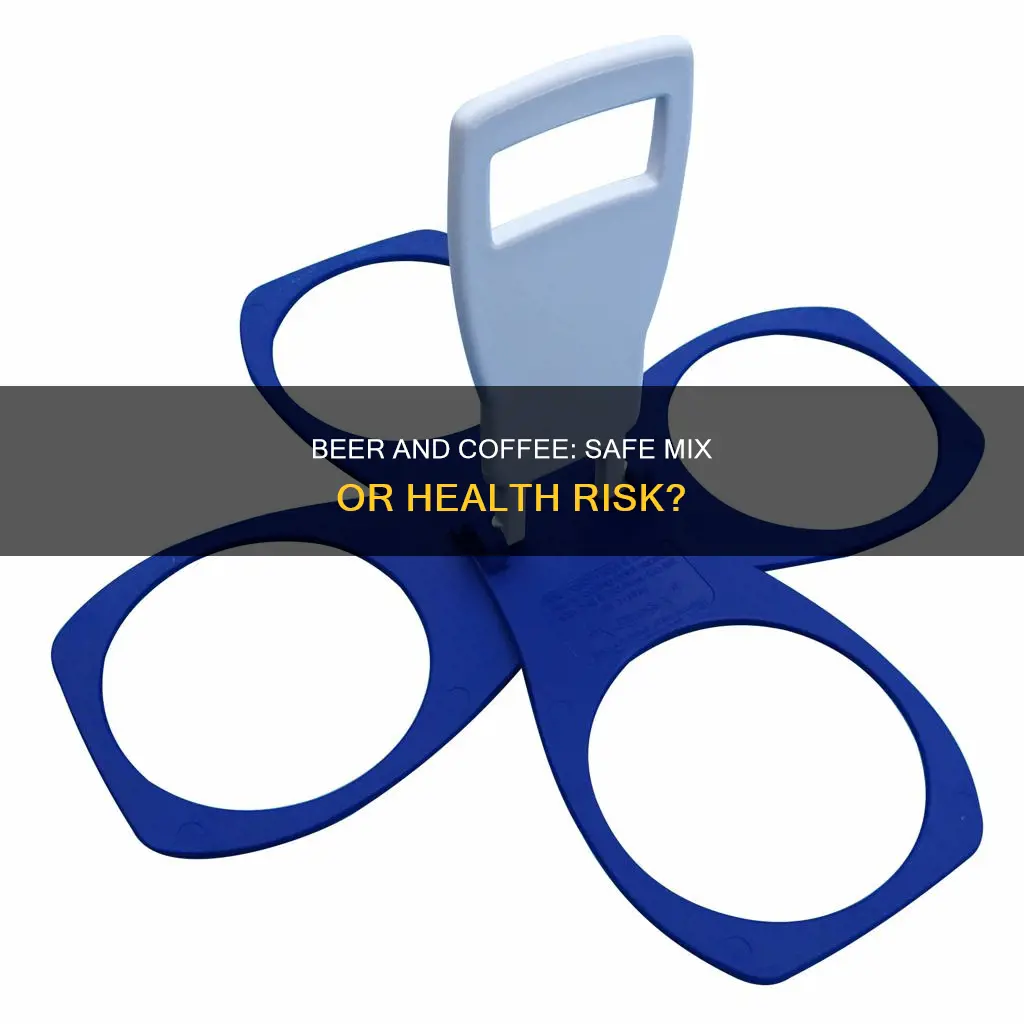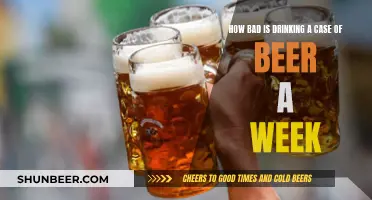
Drinking coffee after beer is a common practice, but is it safe? The short answer is no. While an occasional Irish coffee won't harm you, it's best to avoid mixing alcohol and caffeine. Caffeine is a stimulant that can make you feel more alert and energetic, while alcohol is a depressant that has the opposite effect. When combined, caffeine can mask the effects of alcohol, tricking your brain into thinking you're less drunk than you are. This can lead to increased alcohol consumption, resulting in a higher risk of injuries, accidents, and alcohol poisoning. Mixing alcohol and caffeine can also cause dehydration and increase the chances of risky behaviours and sexual assault. Additionally, caffeine can disrupt sleep, and when combined with alcohol, can cause an energizing rebound that interrupts your sleep in the middle of the night. To avoid these potential dangers, it's recommended to separate your coffee from your beer and opt for decaf if you must end your meal with coffee.
| Characteristics | Values |
|---|---|
| Safety | Drinking coffee after beer is generally not recommended |
| Effect on Blood Alcohol Level | Coffee does not reduce blood alcohol level |
| Effect on Alertness | Coffee may make you feel more alert and less drunk than you are |
| Effect on Health | Mixing coffee and beer may lead to more drinking, injury, and health risks |
| Effect on Blood Pressure | Mixing coffee and beer may lead to higher blood pressure |
| Effect on Heart Rate | Mixing coffee and beer may lead to an irregular heartbeat |
| Dehydration | Coffee and beer are diuretics, which can lead to dehydration |
What You'll Learn

Coffee won't sober you up
While it may be tempting to reach for a cup of coffee after drinking beer to help you sober up, it's important to know that coffee won't actually reduce your level of intoxication. Here's why:
Coffee Blocks the Effects of Alcohol, Not the Alcohol Itself
When you drink alcohol, it signals your brain to release higher levels of the neurotransmitter dopamine, which makes you feel good. Dopamine then activates the production of a chemical called cyclic AMP, which increases your brain activity, energy, and talkativeness. As your brain becomes more active, your body releases special enzymes to keep this chemical in check. Once you stop drinking, alcohol's sedative properties kick in, and your brain starts to slow down, making you feel tired and fuzzy.
However, when you add coffee to the mix, the caffeine blocks the enzymes that control cyclic AMP, ramping up the energizing effects of alcohol and masking its sedating effects. So, while alcohol is still making your brain sluggish, the caffeine makes you feel more energized and less drunk. This can lead to the dangerous misconception that you are sobering up and can result in decisions such as going for another drink or attempting to drive.
Coffee Doesn't Reduce Blood Alcohol Levels
Importantly, while coffee may make you feel more alert, it does not reduce the amount of alcohol in your blood or the way your body processes alcohol. This means that even if you feel more sober, you are still intoxicated and at risk of impaired judgment, dangerous behaviours, or health problems such as alcohol poisoning.
Health Risks of Mixing Caffeine and Alcohol
Mixing caffeine and alcohol can lead to a range of negative health consequences. Firstly, it can increase your risk of drinking more alcohol than usual, leading to stronger alcohol-related health problems and potential damage to your body. Additionally, the combination of caffeine and alcohol can cause dehydration, higher blood pressure, and an irregular heartbeat. People who mix the two are also more likely to report incidents such as unprotected sex, injuries, drunk driving, and riding with a drunk driver.
So, What Can You Do?
If you've had a few drinks, it's best to avoid coffee and opt for a non-caffeinated beverage instead. While it may be tempting to try to perk up with a cup of coffee, doing so won't reduce your intoxication and may even lead to negative consequences. If you must have coffee, choose decaf to minimize the risks associated with mixing caffeine and alcohol.
The Intricacies of a Beer Exchange: Trading and Sampling
You may want to see also

Caffeine masks the effects of alcohol
Caffeine is a stimulant, while alcohol is a depressant. When these two substances are mixed, the stimulant can mask the depressant's effects. In other words, caffeine may mask some of the alcohol's depressant effects, making you feel more alert and energetic. However, it is important to note that caffeine will not reduce your blood alcohol level or change the way your body clears alcohol from your system. The effects of alcohol on your body remain the same, whether it is consumed with caffeine or not.
The masking of alcohol's effects by caffeine can lead to drinking more than intended, increasing the risk of alcohol-related health problems, damage to the body, and even early death. Additionally, mixing alcohol and caffeine can cause higher blood pressure, irregular heartbeat, and dehydration. People who mix alcohol with energy drinks are more likely to report unwanted or unprotected sex, injuries, alcohol-impaired driving, and riding with a drunk driver.
The combination of alcohol and caffeine in beverages has faced criticism and regulation due to the associated health risks. In 2010, the Food and Drug Administration (FDA) in the United States found that adding caffeine to alcoholic drinks was unsafe and no longer met legal safety standards. As a result, companies removed caffeine from their alcoholic products. However, people still mix alcohol with energy drinks, especially young people, and the practice continues to be associated with health risks.
Beer and Benzonatate: Is It Safe to Mix?
You may want to see also

Drinking coffee after beer can cause dehydration
Drinking coffee after drinking beer can have several negative consequences, including dehydration. Both alcohol and caffeine are diuretics, which means they make you urinate more frequently. This can lead to excessive urination and dehydration if you don't consume enough water. Dehydration can cause a range of unpleasant symptoms, including dry mouth, thirst, dizziness, and lightheadedness. In more moderate to severe cases, dehydration can also lead to poor kidney function, muscle cramping, shrunken blood vessels in the brain, and confusion.
The combination of alcohol and caffeine can also increase your risk of other health issues, such as higher blood pressure and an irregular heartbeat. People who mix alcohol with energy drinks are more likely to engage in risky behaviours, such as unprotected sex, alcohol-impaired driving, and injuries. Additionally, caffeine can trick your brain into thinking you are less drunk than you actually are, leading to an increased risk of drinking more alcohol and experiencing alcohol-related health problems.
The stimulating effects of caffeine can also interfere with your sleep, making it difficult to fall back asleep if you wake up in the middle of the night. This can leave you feeling exhausted and more hungover than usual, as caffeine, like alcohol, can have dehydrating effects on the body. Therefore, it is generally recommended to avoid mixing alcohol and caffeine and to separate your consumption of these two beverages.
To avoid dehydration, it is important to consume water along with alcoholic and caffeinated drinks. Additionally, drinking coffee when you already have a hangover can exacerbate your symptoms or make them last longer due to its dehydrating effects. While an occasional Irish coffee may not be harmful, it is important to consume these types of drinks in moderation and be aware of both the alcohol and caffeine content.
Beer Drinking: Weight Loss Friend or Foe?
You may want to see also

Mixing caffeine and alcohol can lead to increased binge drinking
Mixing Caffeine and Alcohol: What You Need to Know
Mixing caffeine and alcohol is a common practice, often done to balance the stimulating effects of caffeine with the sedative effects of alcohol. While this may seem like a good idea, it can actually have some negative consequences, including an increased risk of binge drinking. Here's what you need to know about the effects of mixing caffeine and alcohol and why it can lead to increased binge drinking:
The Stimulant-Depressant Combination
Caffeine is a stimulant that increases energy and alertness, while alcohol is a depressant that can make you feel sleepy and less alert. When combined, the stimulant effects of caffeine can mask the depressant effects of alcohol. This means you might not feel the full impact of the alcohol, making it harder to gauge your level of intoxication. As a result, you may be more likely to drink more alcohol than usual, which can lead to binge drinking.
Hiding the Negative Effects of Alcohol
The masking effect of caffeine on alcohol can lead to dangerous over-drinking. When you mix caffeine with alcohol, you may not feel the usual signs of intoxication, such as drowsiness or impaired coordination. This can give you a false sense of sobriety, leading to increased alcohol consumption. Studies have shown that people who binge drink are more likely to mix alcohol with energy drinks, and they tend to consume six or more drinks at a time.
Health Risks
Mixing caffeine and alcohol can have serious health consequences. Caffeine does not reduce the effects of alcohol on your body; it only masks them. Drinking caffeinated alcoholic beverages can lead to increased alcohol consumption, resulting in a higher risk of alcohol-related health problems, injuries, and even early death. Additionally, the combination of caffeine and alcohol can cause higher blood pressure, irregular heartbeat, and dehydration. People who mix these substances are also more likely to report incidents such as unprotected sex, alcohol-impaired driving, and injuries.
Regulatory Actions
Due to the health risks associated with caffeinated alcoholic drinks, the Food and Drug Administration (FDA) in the United States has taken steps to address this issue. In 2010, the FDA found that adding caffeine to alcoholic drinks was unsafe, and these drinks no longer met legal safety standards. As a result, producers of these beverages removed caffeine and other stimulants from their products. However, people still mix alcohol with energy drinks, especially young adults, which can have similar health risks as pre-mixed caffeinated alcoholic drinks.
In conclusion, while mixing caffeine and alcohol may seem like a harmless combination, it can lead to increased binge drinking and have significant negative impacts on your health. It's important to be aware of the risks associated with this practice and to consume alcohol and caffeine responsibly and in moderation.
Chilling Beer Fast: How Do Chiller Sticks Work?
You may want to see also

Increased risk of injury and health issues
Drinking coffee after drinking beer can increase the risk of injuries and health issues. Coffee contains caffeine, a central nervous system stimulant that can make you feel more alert and energetic. On the other hand, beer is a central nervous system depressant that can cause drowsiness and slow down your reactions. When combined, these opposing substances can have a dangerous interplay, leading to a false sense of sobriety.
Firstly, caffeine can mask the sedative effects of alcohol, tricking your brain into thinking you are less intoxicated than you actually are. This false sense of sobriety can lead to riskier behaviour, such as drinking more alcohol, driving, or engaging in activities that require coordination and quick reflexes. This increases the likelihood of accidents, injuries, and alcohol-related incidents.
Secondly, the combination of caffeine and alcohol can lead to dehydration. Both substances are diuretics, which increase urine production and fluid loss. Dehydration can cause dizziness, lightheadedness, and other unpleasant symptoms. It can also negatively impact your skin, kidneys, muscles, and brain function.
Additionally, mixing caffeine and alcohol can result in higher blood pressure and an irregular heartbeat. This can be particularly dangerous for individuals with pre-existing cardiovascular issues. The combination may also disrupt sleep patterns and contribute to long-term sleep issues such as insomnia, sleep paralysis, and sleep apnea.
Furthermore, consuming caffeinated beverages after drinking beer can irritate the digestive system. Caffeine can worsen digestive issues such as irritable bowel syndrome (IBS) and cause inflammation in the stomach lining due to its acidic properties. This can lead to stomach pain, diarrhoea, and contribute to further dehydration.
It is important to note that the effects of caffeine and alcohol can last for several hours in the body. Even drinking coffee hours before consuming beer can lead to similar harmful effects. Therefore, it is advisable to avoid mixing these two substances to minimise the risk of injuries and protect your overall health.
Beer and Celiac Disease: Is There a Link?
You may want to see also
Frequently asked questions
Drinking coffee after beer is generally not recommended. Caffeine can trick your brain into thinking that you're less drunk than you are, which can lead to drinking more alcohol and increase the risk of alcohol-related injuries, accidents, or poisoning.
Caffeine is a stimulant that can mask the sedative effects of alcohol, making you feel more alert and energetic. However, it does not reduce the amount of alcohol in your blood or change its effects on your body.
Yes, drinking coffee after beer can lead to dehydration, higher blood pressure, irregular heartbeat, and sleep disturbances. It can also increase the risk of engaging in risky behaviours, such as drinking and driving or unprotected sex.







